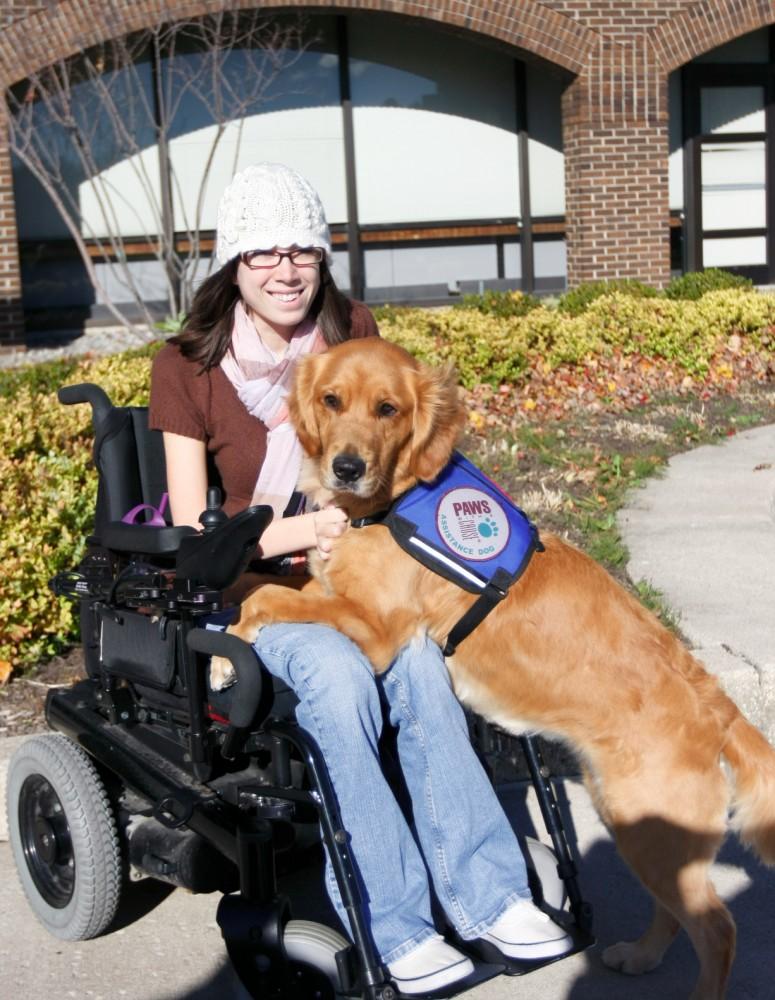Wise-man’s best friend

Ashley Wiseman poses with her guide dog Maui
Oct 28, 2010
When most students drop their keys on the way out the door to class, they can bend over and pick them up. But for senior Ashley Wiseman, dropping keys used to be a nightmare situation – that is, before she got Maui, a trained service dog, to help her out.
“Every time I would almost drop something, I would have this mini heart attack like ‘Oh no! I gotta catch it,’” she said. “It’s not like someone else … If I drop it, I can’t get it.”
At 18 months, Wiseman was diagnosed with Degerine-Sottas Syndrone, a very rare neurological disorder that affects sensory motor skills. Wiseman, who retained the ability to walk up until high school, now uses a powered wheelchair to get around campus.
“That has to do with the distance neural impulses have to travel from the spinal cord to their target location,” she said. “As I got taller, neural impulses had to travel further, and that made (walking) more difficult.”
Wiseman said while she was diagnosed at 18 months, she was not fully aware of the implications of her ailment until high school.
“By middle school it was becoming more difficult to go to my classes, and when I started using the wheelchair my freshman year in high school, I knew things were getting worse,” she said. “I kind of just thought it was because of the lack of exercise, but I came to understand that things weren’t always stable. I might not always be able to do the things I was used to doing.”
The disorder, in combination with Scoliosis surgery that fused several vertebrate together and limited the flexibility of her spine, makes Wiseman unable to perform basic tasks, which Maui now performs for her.
Wiseman uses Maui, a female golden retriever, to pick up things that she drops, open doors using a strap she attaches to doorknobs and handles and take off her jacket, as well as other basic tasks.
Wiseman said she has Maui perform these tasks through a series of commands rather than having the dog perform them instinctively through its training.
“(Service dog trainers) don’t really want the dogs doing things on their own,” she said. “If she picked up everything that I dropped, what if I dropped a pill or something dangerous for her to pick up?”
Now that Maui helps Wiseman with basic tasks, one of Wiseman’s biggest concerns is keeping Maui on track while roaming through a campus full of people waiting to pet her and play with her. She said petting Maui while she’s working can distract her from performing the jobs for which she was trained.
“A lot of people are really nice and ask first, and I have to tell them no because she’s working,” she said. “But then you do get people who are more unconscious of it. They see this really cute dog who is obviously friendly and well-behaved, and they just go in for the pet … That was honestly the biggest adjustment for me.”
It is also important Maui identifies Wiseman as her sole caretaker.
“(Service dogs) are supposed to bond primarily with their owner,” she added. “She’s not going to work as hard if she feels like everyone around her is going to give her free affection.”
Maui’s training came through Paws with a Cause, an animal training organization that “trains assistance dogs nationally for people with disabilities and provides lifetime team support which encourages independence,” according to its website. Maui spent a year learning basic manners with a foster family before being matched with Wiseman and trained for an additional four months to serve her individual needs.
Wiseman and Maui began life together in October 2008, just 11 months after she applied for a service dog. She said she is fortunate to have gotten her so early since it generally takes two years to complete the process.
Wiseman maintains a blog, Tuesdays with Maui, to help people understand the nature of her relationship with Maui as well as answer various questions, including why passing students should not pet the dog.
Her blog can be accessed online at www.tuesdayswithmaui.com.
For more information about service dogs, visit the PWC website at www.pawswithcause.com.

























